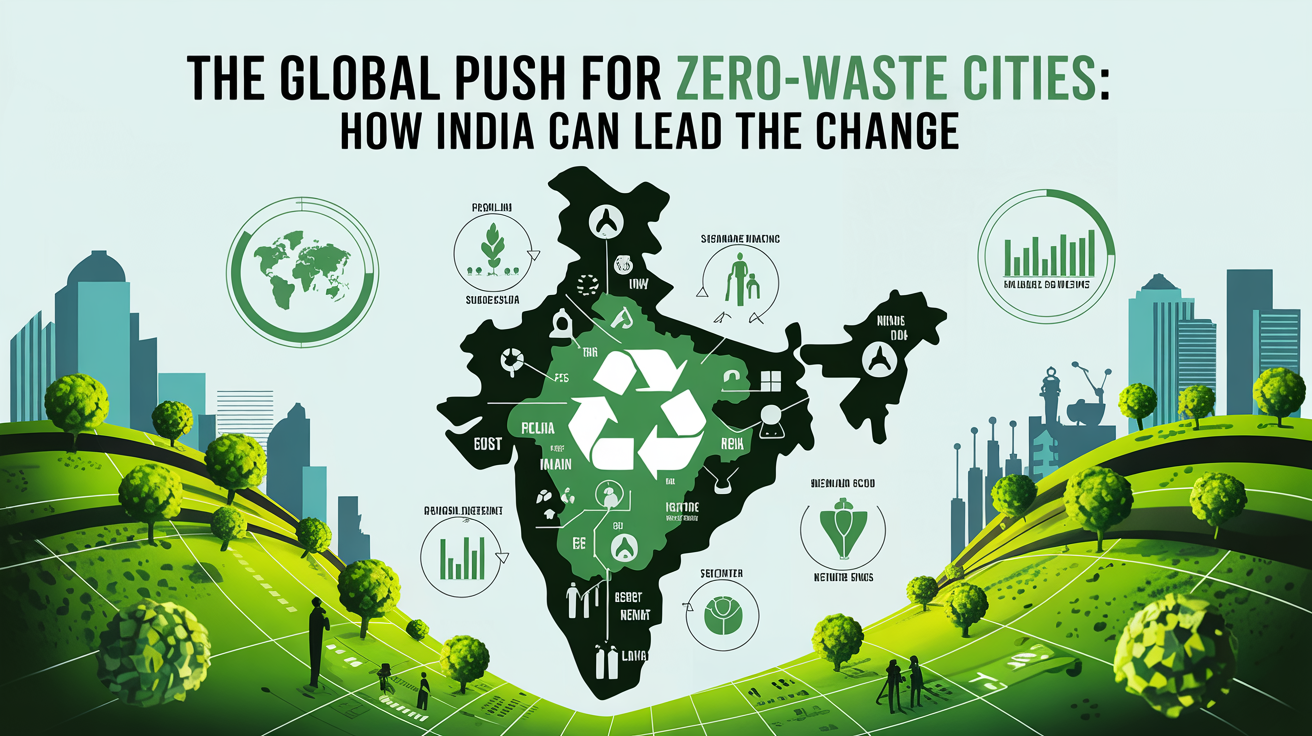From zeroing in on the cities to make it very apparent that waste and environment management in cities have become a more crucial focus worldwide, even for zero-waste cities whose ambition is to reduce waste generation, maximize recycling and composting, and eradicate reliance on landfills. This blog delves into the global zero-waste benchmarking movement, the present scenario of waste management in India, and the future possibilities that such a change may bring for India.
Understanding the Global Zero-Waste Movement
Zero-waste principles are being adopted by almost all cities across the globe to address the increasing waste problem. The approach to zero waste would be to prevent minimal waste from reaching landfills and incinerators by reducing, reusing, and recycling material. All these methods have proved effective in managing urban waste in sustainable ways while promoting a circular economy.
Also read: Kraft Paper from Waste Cartons: A Profitable Business Opportunity.
The Waste Management Conundrum for Zero-Waste Cities:
It is estimated that India produces about 62 million tons of municipal solid waste every year, of which merely 30% is processed. The remaining waste piles up inside thousands of overflowing landfills, thus polluting air, water, and soil. Some of the issues in transmission systems concerning India’s waste management are
1. Absence of Segregation at Source – The Majority of waste is not segregated into biodegradable and non-biodegradable components. Hence, recycling becomes inefficient.
2. Underdeveloped Waste Collection and Processing Infrastructure – The collection and processing of waste have become nonexistent for most urban areas. Most materials end up in the backyards unregulated.
3. Low Public Awareness – Most residents do not know sustainable waste disposal practices, lowering the effectiveness of existing waste management systems.
4. Increasing the Challenges Associated with Plastic Waste – India generates more than 3.5 million metric tons of plastic waste, a huge portion of which goes to either landfills or oceans.
How India Can Step Forward towards Becoming the Champion of Zero Waste?
India can become a leader in the global zero-waste movement if it develops more detailed and creative methods of waste management, such as these:
1. Strengthening Waste Segregation at Source
This can be achieved through a series of steps to promote waste segregation at the household and community levels—stringent measures in penalty for noncompliance. Providing separate bins for wet and dry waste to households.
2. Extending the Waste Collection and Recycling Infrastructure
India needs to invest in More-nohod more waste collection centres and MRFs, Advanced technologies for recycling purposes that will improve the processing of plastic, electronic and organic wastes, and to discuss the possibilities of joint ventures with private players and start-ups dealing in waste management solutions.
3. Promoting the Circular Economy Model
A circular economy minimizes waste by keeping materials in use for as long as possible. India could promote eco-friendly packaging as well as discourage single-use plastics. Incentivize businesses that increasingly introduce recycled materials into their products. Have producer responsibility programs whereby manufacturers would be responsible for the disposal of waste.
4. Waste to Energy Implement Waste to Energy technologies
Sweden has been effective in energy-from-waste programs. By these efforts, India can also do the following: As with waste-to-energy plants producing power from unrecyclable waste, biogas generation from organic wastes eliminates fossil fuel dependence.
5. Public Participation and Awareness
Behavior change is most important for zero waste. To motivate the citizens to participate in Environmental education in schools and colleges with incentives such as tax rebates or subsidies to communities practicing sustainable waste management. Digital and social media campaigns to amplify the message of waste reduction.
6. Stronger Policies and Regulations
To make government policies enforceable for effective waste management, a few important measures should be – Strict enforcement of the prohibitory ban on single-use plastics.
Related Business Plan: Biomass Pellets from Bio Waste
Successful Zero-Waste Initiatives in India
There are several models of waste management that have really proved true in some cities and communities in India.
1. Pune’s SWaCH Model
A cooperative of waste pickers has an incorporation of door-to-door waste collection and thus ensures high rates of recycling.
2. Ambikapur’s Zero Waste Model
Nearly 100% waste segregation is achieved in this town of Chhattisgarh, while the city has now taken its landfill site towards planting a public garden.
3. Clean City Model of Indore
Indore, the cleanest city in India, has a good take on waste-to-compost as well as public participation in waste management.
Closing Thoughts
Thus, there is a vibrant possibility that India can lead the way in the world’s zero waste movement. Stringent policies on waste segregation, an improved recycling infrastructure, community involvement, and stricter laws could make India’s push toward sustainable urban living quite impactful. With the right mix of government and business action, along with citizen will, it would be remarkably positioned to set an example for the world and create cleaner, greener, and waste-free cities.
















